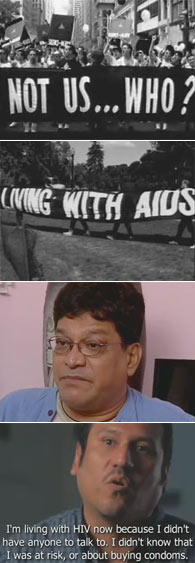HIV researchers have warned that stigma, repressive laws and poor access to health services "have sparked alarming epidemics that threaten to devastate MSM communities in Asia, Africa, Eastern Europe, and Latin America, mirroring the HIV epidemics that ravaged gay communities in North America and Western Europe in the 1980s."

From top: early AIDS marches in the 80s in the US. ''If not us, then who?''… a slogan commonly used to rally those in attendance to get behind the effort. Second pic from the bottom: Ashok Row Kavi, the founder of the Humsafar Trust, a grassroots MSM group in India. Last pic: a HIV+ man from Peru speaking of his experience in the video. Click here to watch video about amfAR's new initiative..
According to amfAR, statistics show that infection rates are growing among MSM in Africa, Asia and Latin America, of which less than five percent have access to HIV-related health care.
"It is estimated that one in 20 men who have sex with men have access to appropriate HIV prevention, treatment, care and support services," said Kevin Frost, amFAR's chief executive officer. "This is a massive failure of the HIV/AIDS response globally and I think one that needs to be addressed."
Laws criminalising sex between men exist in 85 countries including Singapore, Malaysia, India and Sri Lanka as well as a large number of countries in Africa and the Middle East. As such, widespread stigma often prevents MSM from using HIV/AIDS and public health services.
In Africa, nearly 40 percent of MSM in Kenya and nearly 22 percent in Senegal are estimated to be HIV positive, compared to six percent in the rest of Kenya's adult population and 0.9 percent in Senegal's. In Ukraine, HIV prevalence among MSM is estimated at 27 percent, and in Mexico at 15 percent.
"The frightening truth is that, in many parts of the world, we simply do not know how bad the epidemics (are) among MSM because transmission in this group is not tracked in many countries," said Dr Chris Breyer, director of the Johns Hopkins Fogarty AIDS program, in a statement released by amFAR.
According to Frost, more research into MSM was crucial, as not enough was known about HIV epidemics among this community. "In China, for example, 80 percent of men who have sex with men are married... this is an enormously complex situation, which needs to be looked at."
The term also includes men who identify as "gay," but also encompasses any men who have sexual encounters with other men as well as "men" whose gender and sexual identities defy Western categorisation.
In the statement, amFAR notes that in India there are at least three designations of MSM. Kothis are effeminate MSM who are often married to women and have families. Panthis are masculine men who have sex with kothis, and hijras, who are often castrated, are considered to be a third gender altogether.
"The HIV epidemic in men who have sex with men in India is really bad. It has occurred for a simple reason: We have been totally neglected and invisible," said Ashok Row Kavi, the founder of the Humsafar Trust, a grassroots MSM group in India. "The programs that are working for MSM are those where community-based groups have been empowered to take control."
Under the new initiative, amFAR will seek to raise US$3 million over the next three years to support grassroots organisations, fund research and advocate increased global attention for AIDS programmes targeting MSM. It has already raised US$1 million from private donors toward this effort.
UNAIDS deputy executive director Michel Sidibe stressed that this was one of the world's most urgent public health needs. "You can't talk about fighting the pandemic if we are still marginalising groups. We have to empower MSM and make sure they have the right to access basic health care."
Although countries have begun to recognise the needs of more easily identifiable high-risk groups, such as sex workers and injecting drug users, MSM were still being ignored.
Compounding the challenges, amfAR also noted that MSM groups rarely benefit from international HIV prevention efforts because bilateral funding and grants from the Global Fund to Fight AIDS, Tuberculosis and Malaria flow primarily through national governments which largely ignore the needs of MSM.
To watch the video and for more information about amfAR and the MSM
Initiative, visit www.amfar.org.
